My dad and I have a pastime not common to many father/daughter combos. We call it guitar gawking. It's a simple process, really. We find a music store that sells guitars. We go there. We stare at guitars, fondle them, compare and scrutinize, note the changes since the original was released. We go from the sweet smelling acoustic room to the wall of electric guitars, sometimes even pressing up against the cases of musical relics with price tags of monumental proportions. See, like baseball and fishing, a love of guitars is something I share with my dad. His support in my musical endeavors shaped me immensely. Gave me confidence. Gave me a voice.
But that isn't the case with many little girls. I learned my first chords on my dad's Martin Shenandoah, and rocked out for the first time on his Les Paul. I had choice instruments. But plenty of girls have none at all. Especially not guitars. And if their dads can play, chances are they're not going to share. In fact, a widely cited statistic is that only 7% of electric guitars sold are purchased by women.
In music, it may be that our perceptions of what's acceptable for girls and boys really hasn't come a terribly long way. And it starts young. Take this BBC article from 2008, citing a report by the Institute of Education. At that time, in the UK, boys dominate the "cooler" instruments: 81% of electric and bass guitar players were boys. Girls ranked high with the harp (90%) and the flute (89%). From the BBC article, Julianne Regan of All About Eve recounts her experience growing up in music:
In spite of the Alanis Morisettes and Bonnie Raitts and Julianne Regans of the world, women have a different set of challenges in the music (and any media) industry still. Growing up with a guitar in hand is a different experience for girls in many ways, because it's just not considered girly. In his piece in the Washington Post called "No Girls Allowed" David Segal suggests a few reasons for this:
But I think that argument is getting old. Chuck Berry might as well be George Washington to most kids today. More and more women are bursting out into the indie scene. There are even guitar companies like Luna and Daisy Rock that make instruments specifically for women and our smaller hands. It's not the next generation that's the problem, it's their parents and grandparents who think that girls won't play guitars because they're phallic or unladylike or quirky.
Listen. We all know that music education is statistically magical. I mean, it improves everything from English language testing to cognitive learning to social interaction. There's no argument there. But unfortunately, music programs of all stripes in the US are being cut dramatically, and while it used to be common for most kids to receive basic musical training, that's no longer the case, especially in at-risk schools. In 2009, it was reported that the the percentage of kids with access to music declined by 50%. And sadly, there's a big chance that this bleak situation isn't going to change any time soon. Public schools especially just don't have the money, and the arts almost always go first.
But here's the point: As parents, we've got a lot of power, and we can still do a great deal of good outside the classroom walls when it comes to giving our daughters a rockin' musical education. When I was in high school in the 90s, we had a very rudimentary music program, with no formal orchestra and a passing acceptance of the arts. In general, sports got the lion's share of funding. But that didn't mean those of us with supportive parents didn't get our musical education. On the contrary, my dad taught me. Personally. He sat through Counting Crows August and Everything After and showed me the chords. He introduced me to the Beatles. All those benefits from musical education came from him.
So this is my suggestion. Dads (and moms, if you're lucky enough to be among the guitar-slinging few): give your girl a guitar. Show her that it's okay to rock. Teach her the chords to "Ana Ng" or "Still Alive" and perform it together. Instill a love of music in her while she's young and proud and unfettered. Guitars are one of the most portable, accessible instruments in the world. She'll make friends, get smarter, and have a gift that will last her entire life. I know it continues to enrich mine, and it will enrich my daughter's when she's old enough.
Give your girl a guitar and you never know what she'll do. Sure, she might not be a rock star. But giving her permission to do so? It doesn't get more empowering than that.
